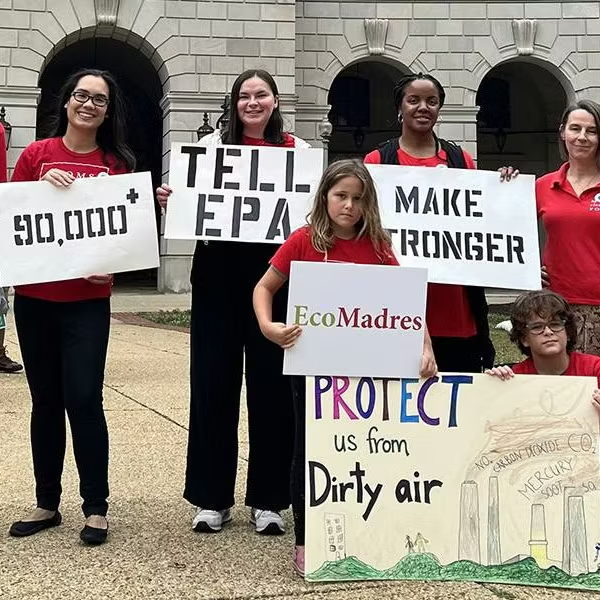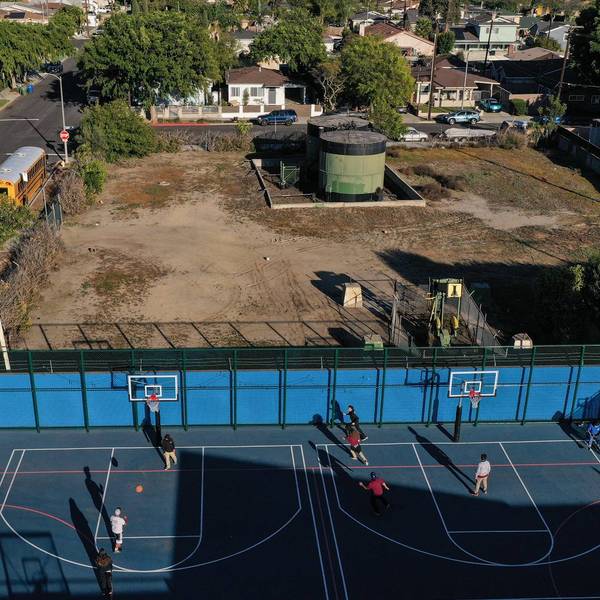Outrage: As Mountaintop Removal Linked to Birth Defects, Politicians Gut Clean Water Act
I just can't stop thinking about a new scientific study published this week that found there are "significantly higher" rates of birth defects near mountaintop removal coal mining operations.
As a mother of a 1-year-old, I can vividly remember the long wait of pregnancy. I was so excited to meet my new daughter, and so hopeful that she would be healthy. I imagine every expectant mom spends a few sleepless nights worrying that her new baby will suffer birth defects. When I was pregnant, I did everything I could to give her the best possible start in life: exercising, eating right, giving up alcohol and even -- though I can't imagine now how I survived it -- caffeine.
So how would you feel if the very place where you live -- the air you breathe and the water you drink -- means that your baby is at greater risk, even if you take perfect care of yourself? The list of birth defects that threaten babies in the Appalachian coalfields, according to this new study, is gruesome, including circulatory/respiratory, central nervous system, musculoskeletal, gastrointestinal, and urogenital problems.
My daughter is an 11th generation West Virginian, and we are turning her heritage into a toxic waste dump, unfit for the next generation of West Virginia's children.
Given this groundbreaking new study, I find it particularly enraging that the US House of Representatives is currently trying to pass a bill (HR 2018) that would actually gut the Clean Water Act in order to make it easier for coal companies to continue blowing up Appalachia's mountains and spewing pollution into the air and water of nearby towns and homes. The bill is sponsored by Reps. Nick Rahall of West Virginia and John Mica of Florida. It is a polluter wish list, with ramifications that extend far beyond Appalachian coal country.
Among other things, the bill would:
- Prevent the Environmental Protection Agency (EPA) from enacting new clean water protections in a state unless it had permission from that state (and many states are much more lenient with polluters than the EPA).
- Take away EPA's authority to veto water pollution permits issued by other agencies, a power that EPA rarely wields but did use earlier this year to veto the largest mountaintop removal permit in U.S. history, the Spruce mine permit in West Virginia.
- Eliminate the modest, common-sense water quality standards for Appalachia that the EPA put in place last year.
The EPA has said this bill would essentially "overturn" the Clean Water Act.
At a time when we are learning that pollution from mountaintop removal coal mining is so pervasive it even hurts babies in the womb, weakening the clearly inadequate clean water protections we have in place is appalling, and is an insult to the people of Appalachia.
We need your help. Please call your Member of Congress today at 202-224-3121 and ask them to oppose HR 2018, the "Clean Water Cooperative Federalism Act of 2011."
An Urgent Message From Our Co-Founder
Dear Common Dreams reader, The U.S. is on a fast track to authoritarianism like nothing I've ever seen. Meanwhile, corporate news outlets are utterly capitulating to Trump, twisting their coverage to avoid drawing his ire while lining up to stuff cash in his pockets. That's why I believe that Common Dreams is doing the best and most consequential reporting that we've ever done. Our small but mighty team is a progressive reporting powerhouse, covering the news every day that the corporate media never will. Our mission has always been simple: To inform. To inspire. And to ignite change for the common good. Now here's the key piece that I want all our readers to understand: None of this would be possible without your financial support. That's not just some fundraising cliche. It's the absolute and literal truth. We don't accept corporate advertising and never will. We don't have a paywall because we don't think people should be blocked from critical news based on their ability to pay. Everything we do is funded by the donations of readers like you. Will you donate now to help power the nonprofit, independent reporting of Common Dreams? Thank you for being a vital member of our community. Together, we can keep independent journalism alive when it’s needed most. - Craig Brown, Co-founder |
I just can't stop thinking about a new scientific study published this week that found there are "significantly higher" rates of birth defects near mountaintop removal coal mining operations.
As a mother of a 1-year-old, I can vividly remember the long wait of pregnancy. I was so excited to meet my new daughter, and so hopeful that she would be healthy. I imagine every expectant mom spends a few sleepless nights worrying that her new baby will suffer birth defects. When I was pregnant, I did everything I could to give her the best possible start in life: exercising, eating right, giving up alcohol and even -- though I can't imagine now how I survived it -- caffeine.
So how would you feel if the very place where you live -- the air you breathe and the water you drink -- means that your baby is at greater risk, even if you take perfect care of yourself? The list of birth defects that threaten babies in the Appalachian coalfields, according to this new study, is gruesome, including circulatory/respiratory, central nervous system, musculoskeletal, gastrointestinal, and urogenital problems.
My daughter is an 11th generation West Virginian, and we are turning her heritage into a toxic waste dump, unfit for the next generation of West Virginia's children.
Given this groundbreaking new study, I find it particularly enraging that the US House of Representatives is currently trying to pass a bill (HR 2018) that would actually gut the Clean Water Act in order to make it easier for coal companies to continue blowing up Appalachia's mountains and spewing pollution into the air and water of nearby towns and homes. The bill is sponsored by Reps. Nick Rahall of West Virginia and John Mica of Florida. It is a polluter wish list, with ramifications that extend far beyond Appalachian coal country.
Among other things, the bill would:
- Prevent the Environmental Protection Agency (EPA) from enacting new clean water protections in a state unless it had permission from that state (and many states are much more lenient with polluters than the EPA).
- Take away EPA's authority to veto water pollution permits issued by other agencies, a power that EPA rarely wields but did use earlier this year to veto the largest mountaintop removal permit in U.S. history, the Spruce mine permit in West Virginia.
- Eliminate the modest, common-sense water quality standards for Appalachia that the EPA put in place last year.
The EPA has said this bill would essentially "overturn" the Clean Water Act.
At a time when we are learning that pollution from mountaintop removal coal mining is so pervasive it even hurts babies in the womb, weakening the clearly inadequate clean water protections we have in place is appalling, and is an insult to the people of Appalachia.
We need your help. Please call your Member of Congress today at 202-224-3121 and ask them to oppose HR 2018, the "Clean Water Cooperative Federalism Act of 2011."
I just can't stop thinking about a new scientific study published this week that found there are "significantly higher" rates of birth defects near mountaintop removal coal mining operations.
As a mother of a 1-year-old, I can vividly remember the long wait of pregnancy. I was so excited to meet my new daughter, and so hopeful that she would be healthy. I imagine every expectant mom spends a few sleepless nights worrying that her new baby will suffer birth defects. When I was pregnant, I did everything I could to give her the best possible start in life: exercising, eating right, giving up alcohol and even -- though I can't imagine now how I survived it -- caffeine.
So how would you feel if the very place where you live -- the air you breathe and the water you drink -- means that your baby is at greater risk, even if you take perfect care of yourself? The list of birth defects that threaten babies in the Appalachian coalfields, according to this new study, is gruesome, including circulatory/respiratory, central nervous system, musculoskeletal, gastrointestinal, and urogenital problems.
My daughter is an 11th generation West Virginian, and we are turning her heritage into a toxic waste dump, unfit for the next generation of West Virginia's children.
Given this groundbreaking new study, I find it particularly enraging that the US House of Representatives is currently trying to pass a bill (HR 2018) that would actually gut the Clean Water Act in order to make it easier for coal companies to continue blowing up Appalachia's mountains and spewing pollution into the air and water of nearby towns and homes. The bill is sponsored by Reps. Nick Rahall of West Virginia and John Mica of Florida. It is a polluter wish list, with ramifications that extend far beyond Appalachian coal country.
Among other things, the bill would:
- Prevent the Environmental Protection Agency (EPA) from enacting new clean water protections in a state unless it had permission from that state (and many states are much more lenient with polluters than the EPA).
- Take away EPA's authority to veto water pollution permits issued by other agencies, a power that EPA rarely wields but did use earlier this year to veto the largest mountaintop removal permit in U.S. history, the Spruce mine permit in West Virginia.
- Eliminate the modest, common-sense water quality standards for Appalachia that the EPA put in place last year.
The EPA has said this bill would essentially "overturn" the Clean Water Act.
At a time when we are learning that pollution from mountaintop removal coal mining is so pervasive it even hurts babies in the womb, weakening the clearly inadequate clean water protections we have in place is appalling, and is an insult to the people of Appalachia.
We need your help. Please call your Member of Congress today at 202-224-3121 and ask them to oppose HR 2018, the "Clean Water Cooperative Federalism Act of 2011."

